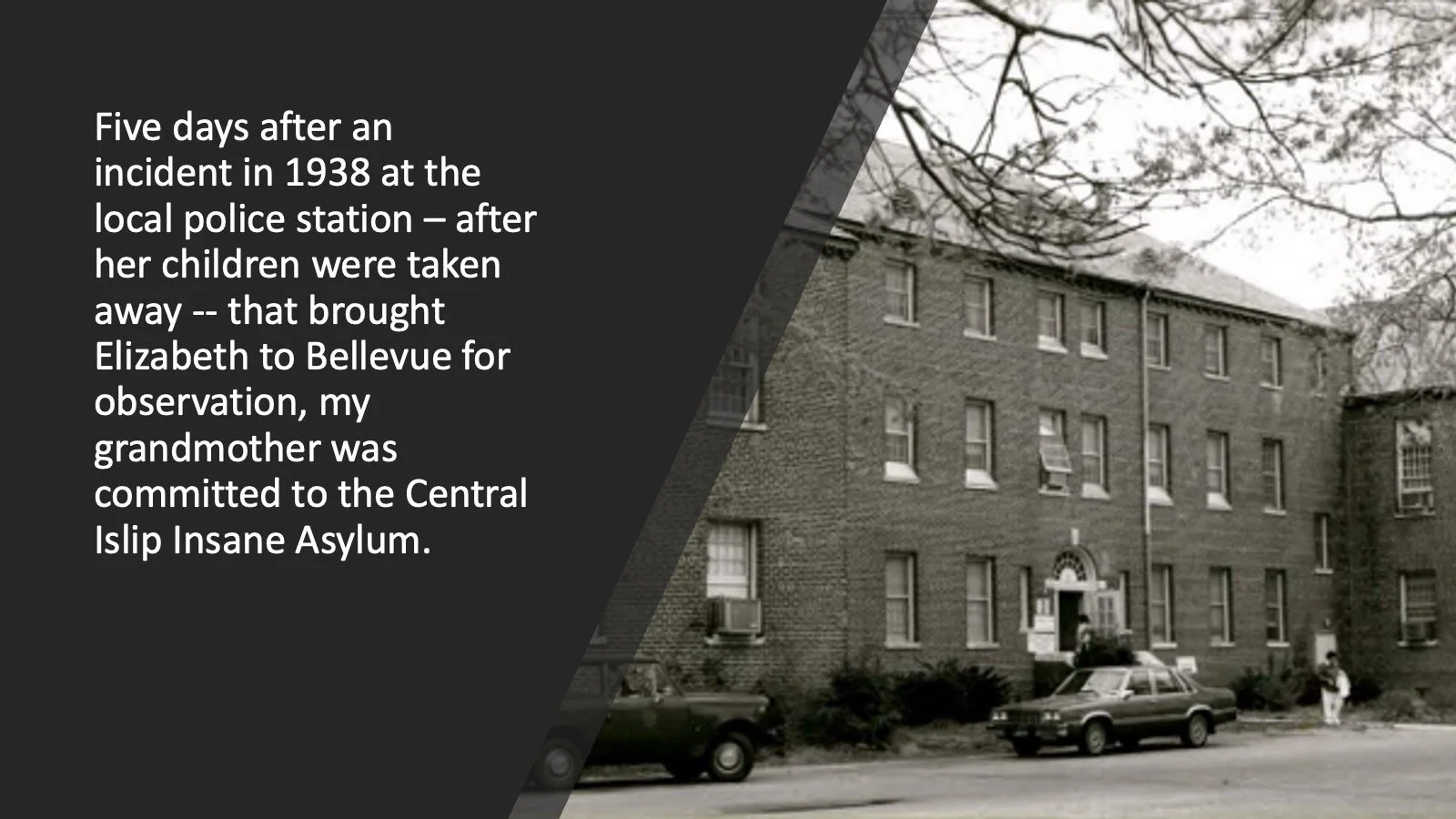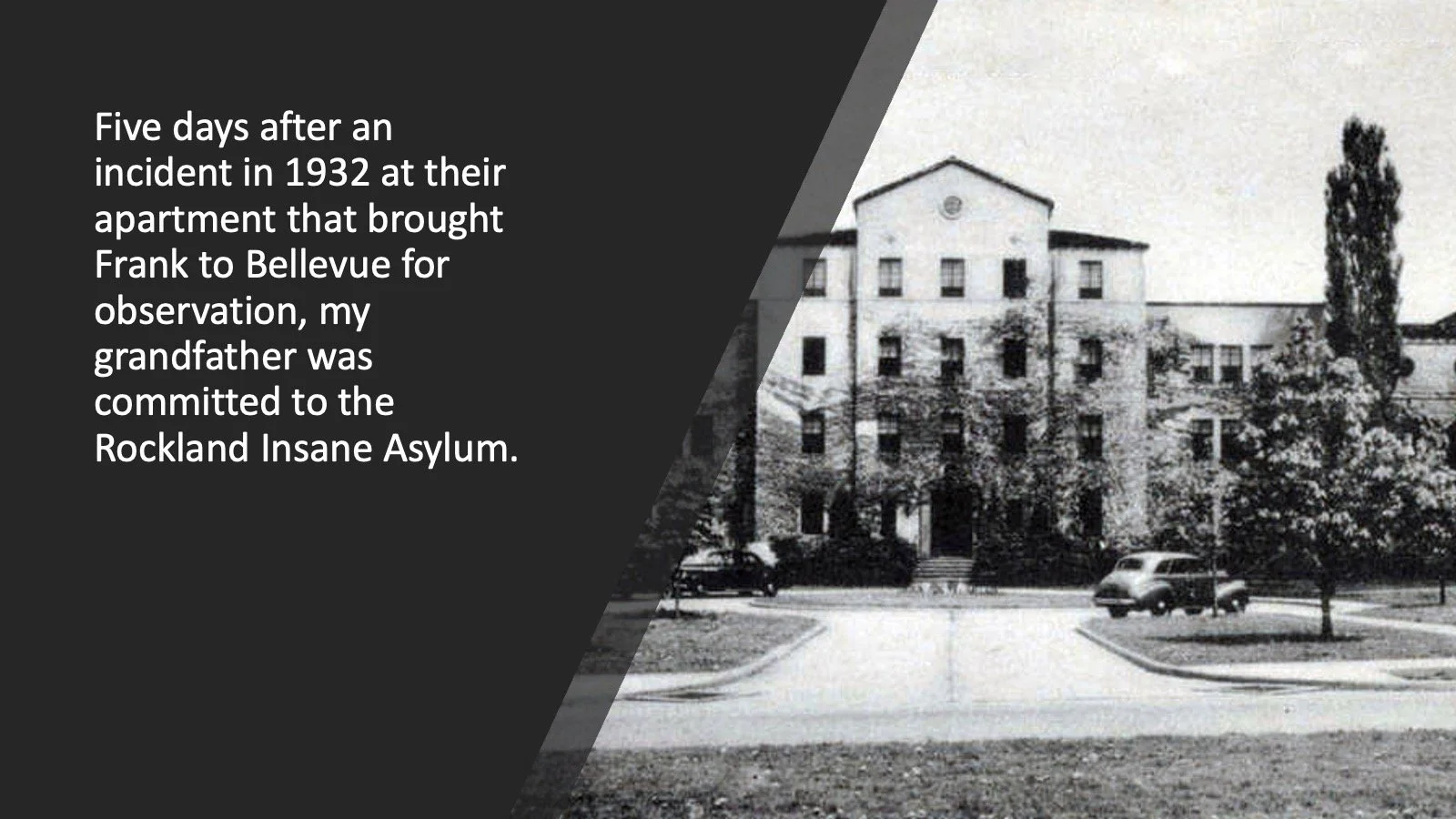A snapshot of family stories from just one New York State Asylum
One of the comments I get most often when I tell the sad tale of my Italian immigrant grandparents and their lost 122 years in New York State mental institutions is, “That’s just an unbelievable story!”
I think at one point I might have agreed with the “unbelievable” characterization. But the other set of comments I hear are from the many people who have also experienced “lost” relatives due to mental illness and their frustration with brick walls that have been put up by state authorities, blocking access to the records of their own dead relatives.
In the case of my family, the records have been hidden away by the New York State Office of Mental Health, justifying “privacy” concerns. I’ve written about this before (see Genealogists Unite – Release the Records! and How will future genealogists know what is truth? and Remember when there was a thing called Privacy?) so I won’t belabor the irrationality of focusing our privacy energies on dead people in an era of exploding privacy challenges for real live people.
Let me just remind everyone of the policy of New York State with regards to health records of dead people. Per the New York State Office of Mental Health, if you are a family member of a deceased patient, you can request information if:
You have proof of the patient’s permission prior to his/her death.
It is relevant to your own health and is requested by your physician.
You are the executor of the estate and have included a copy of court papers.
Have written consent from the executor.
Which, of course, means that for the most part, no one who cares about these records can actually access them.
But going back to my original point – the many people who have also “lost” relatives – let me focus on the impact that these restrictive policies have on real people who are attempting to deal with true family tragedies. Here is a sample of comments in reaction to a blog post by Alexandra Kulick - Accessing Central Islip State Hospital Records – on her excellent Seashells and Crumbs blog.
My grandfather was dropped off at a police station on Christmas Eve of 1922 and never saw his mother again. The story has stuck with me for my entire life. As a kid, I couldn't imagine never seeing my mom again, and as a mom, I cannot imagine parting with my children. The extenuating circumstances must have been extreme, but they're remained a mystery nearly 100 years later. What we do know is that my great grandmother ended up at Central Islip State Hospital, and presumably died there, though no death certificate has been located. (Note: from the blog post itself.)
My great-aunt was sent to CI and spent 50 years there before dying. I have not even been able to get a death certificate as I am told Suffolk County controls it rather than the State of New York. I see no rationale for the secrecy surrounding these records. My great aunt would be 124 years old and died 50 years ago. I doubt she would care.
I have been looking for years to find anything I can about my great grandmother because it haunted my grandmother her whole life that her mom was taken away and then died before she was to come home from Central Islip.
On Ancestry, I found a 1930 census record for my aunt who was a patient there, but have been unable to find any other information about her. All I know is that is immigrated to the USA, arriving in NY with her family when she was 11 years old (year of birth 1897). I do not know how long she was there and I never got to meet her. She was not talked about much back then…Although mental health was a taboo subject back then, no one deserves to be erased from a family.
I've been looking for my Great Grandmother's information for quite some time. She was institutionalized at Central Islip Hospital in 1924 and apparently died there in 1950. I was thinking about this tonight at 12:44 a.m. and just questioning why she was there for 24 years...and my Grandfather (her son) never ever brought up the subject of his Mother.
Two years ago 2018, through DNA, I discovered that my father's sister, who emigrated to Brookhaven, Long Island, in 1907 age 16 with an aunt and uncle, was at Islip from 1933 until she died 42 years later. I found her surviving son, age now 92, and living in Riverhead, Long Island and had a family reunion (we are first cousins). He told me that when he was age 6, his mother was taken away from the home while he was screaming.
In 1933, when my cousin was 6, he remembers his mother being taken away in a black car and he was crying. She was taken to Islip State Hospital and died there in 1975.
I had relatives in CI. One of my father's uncles was committed via the Bellevue route and lived there 36 years. His diagnosis was "Psychosis due to convulsive disorder <epilepsy>") when he was 31 and was there the remainder of his life.
My paternal grandfather was committed in 1942 and died 17 days later. I could find no records regarding the commitment.
My aunt (my father's sister) emigrated to New York at age 17 around 1907 from London, England. She was living in Suffolk County near Islip and met her husband and married in 1914. She was supposedly happy. Had 4 children. In 1933 her husband had her put away at the Central Islip Hospital. She lived there for the rest of her life until she died in 1975.
All these quotes (names intentionally dropped out) are drawn from comments on one blog post about a single institution…Imagine the scale of unresolved pain and family tragedy.
Of course, the stories go on and on. My grandparents’ stories also involved the Rockland and Buffalo Asylums.
The tragedy of many of these stories can’t be changed. But compounding the tragedies by keeping these records locked up is inexcusable.
It’s time for a change in how we treat these records. Reclaim the Records.
Note: Alexandra Kulick kindly interviewed me about my grandparents’ stories. The interview is here – Immigrant Secrets: An Interview with John Mancini.







